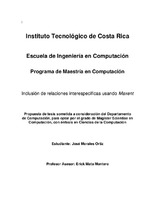Inclusión de relaciones interespecíficas usando Maxent.
Abstract
The species' distribution models are normally feed by occurrences, geo referenced data points where a
specie has been seen, and climatic information such as precipitation, solar radiation, temperature, among
others. The species geographic distribution not only depends on those variables, there are other factors
such as the relationship between the species or the geographic barriers, as ridges and lakes.
The present research try to improve the quality of the species' distribution models by including the
relationship between the species. In order to achieve that three bird species and the relationship with the
plants which serve them as food were defined. The selected species are the lapa verde (Ara ambiguus) and
its relationship with the almendro amarillo (Dipteryx panamensis), the pájaro campana (Procnias
tricarunculatus) and its relationship with the Lauracea family and finally the quetzal (Pharomachrus
mocinno) and its relationship with the Lauracea family as well.
In order to include the relationship between species into the species' distribution models a methodology in
order to build a layer of "range of influence" were defined; with this new layer a set of experiments were
defined, and those experiments verifies that by including the relationships between the species into the
species' distribution models improve their precision. In order to measure the improvements the AUC curve
were calculated for each model, in that way a numeric comparison were done.
Description
Proyecto de Graduación (Maestría en Computación) Instituto Tecnológico de Costa Rica, Escuela de Ingeniería en Computación, 2015.
Share
Metrics
Collections
- Maestría en Computación [119]


